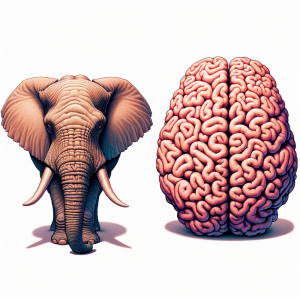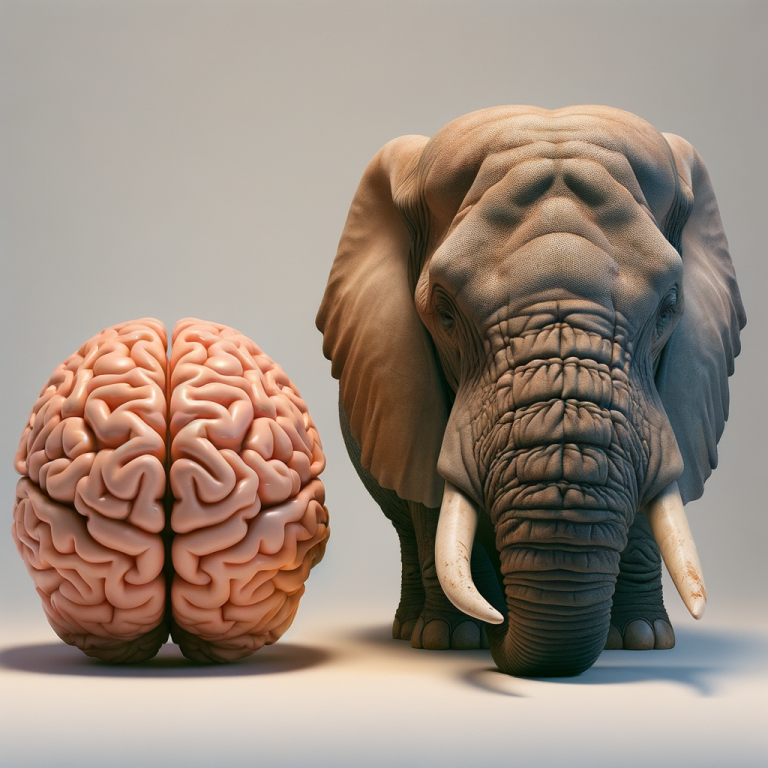Understanding the Elephant Brain Compared to Human
Exploring the significance of the elephant brain and its comparison to the human brain, this article aims to shed light on the structure, function, and cognitive abilities of these majestic creatures. With a focus on brain size and evolutionary significance, we’ll delve into the fascinating world of elephant cognition and its implications for our understanding of human evolution.
Discovering the Surprising Similarities and Differences Between Elephant and Human Brains
Find out how the size and structure of an elephant’s brain compares to that of a human, and what this reveals about the fascinating world of animal intelligence.
Elephant Brain Size
When comparing the size of an elephant’s brain to that of a human, it is evident that elephants have much larger brains. On average, an adult human brain weighs about 1.4 kilograms (3.1 pounds), while an adult elephant brain can weigh up to 5.4 kilograms (11.9 pounds). This significant difference in size is a key factor in understanding the cognitive abilities of elephants compared to humans.
To present these measurements and statistics clearly, a table can be used to illustrate the comparison between the two species’ brain sizes. This will provide a visual representation of the substantial difference in brain size between elephants and humans.
Structure and Function
When examining the structure and function of the elephant brain compared to the human brain, several key differences and similarities become apparent.
- Size: The elephant brain is larger than the human brain, weighing around 11 pounds (5 kg) compared to the average human brain weight of 3 pounds (1.4 kg).
- Cerebral Cortex: While the human brain has a highly developed cerebral cortex responsible for advanced cognitive functions, the elephant brain has a less convoluted cortex, but with a similar number of neurons.
- Brain Structure: Both the elephant and human brains have similar structures, including the frontal lobes, temporal lobes, parietal lobes, and occipital lobes, although the proportions differ.
- Function: The elephant brain is specialized for complex social interactions, communication, and memory, while the human brain is known for its advanced problem-solving abilities and language skills.
Understanding these differences and similarities in the structure and function of the elephant brain compared to the human brain provides valuable insights into the cognitive abilities and behaviors of both species.
 Cognitive Abilities
Cognitive Abilities
When it comes to cognitive abilities, the elephant brain is a fascinating subject of study. Despite having a brain that is smaller in size compared to the human brain, elephants exhibit remarkable cognitive abilities that are worth exploring and understanding.
- Memory: Elephants are known for their exceptional memory, which allows them to remember complex social structures, migration routes, and the locations of water sources over long periods of time. This ability to retain and recall information is comparable to the cognitive abilities of humans.
- Problem-solving: Elephants have demonstrated problem-solving skills in various situations, such as finding food and water in their natural habitats. Their ability to use tools and exhibit innovative behaviors in response to challenges showcases their advanced cognitive capabilities.
- Emotional intelligence: Elephants display a high level of emotional intelligence, forming deep social bonds and exhibiting empathy towards other members of their herd. Their ability to express emotions and form complex relationships suggests a level of cognitive complexity similar to that of humans.
These cognitive abilities of elephants, when compared to human cognitive abilities, provide valuable insights into the evolutionary development of intelligence and social behavior in both species. By studying the elephant brain and its cognitive functions, researchers can gain a deeper understanding of the similarities and differences between human and elephant cognition, shedding light on the complexities of the animal mind.
Evolutionary Significance
When considering the evolutionary significance of the elephant brain compared to the human brain, it is important to examine the development of these organs over time. The elephant brain has undergone significant evolutionary changes, leading to its large size and complex structure. This has allowed elephants to develop advanced cognitive abilities and social behaviors that are essential for their survival in the wild.
One of the key evolutionary advantages of the elephant brain is its ability to process and retain a vast amount of information, allowing elephants to navigate their complex social structures and environments. This is particularly evident in their exceptional memory, which enables them to remember important locations, individuals, and migration routes over long periods of time.
Furthermore, the development of the elephant brain has also contributed to their problem-solving abilities, emotional intelligence, and communication skills. These cognitive traits have played a crucial role in the survival and success of elephant populations in various habitats across the world.
When compared to the evolutionary development of the human brain, it is clear that both species have experienced significant changes over time. While the human brain has evolved to support advanced language, abstract thinking, and complex social structures, the elephant brain has adapted to meet the unique challenges of their environment and social dynamics.
Overall, the evolutionary significance of the elephant brain compared to the human brain highlights the remarkable adaptations that have occurred in both species, shaping their cognitive abilities and behaviors in distinct ways.
Conclusion
In conclusion, the elephant brain compared to human is a fascinating subject that offers valuable insights into the cognitive abilities and evolutionary significance of these majestic creatures. Throughout this article, we have explored the size, structure, and function of the elephant brain, as well as its cognitive abilities and evolutionary significance. It is clear that understanding the elephant brain in relation to human cognition and evolution is of great importance. By comparing the elephant brain to that of humans, we can gain a deeper understanding of the complexities of brain development and cognitive abilities in different species.


Comments are closed.